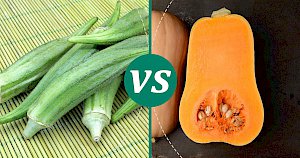Butternut Squash vs Okra: Calories & Nutrition Showdown


Butternut squash vs Okra
Nutrition Facts
Serving size:
change
5g10g15g20g30g40g50g60g80g100g120g140g160g180g200g220g250g300g350g400g450g500g600g700g800g900g1000g
1oz2oz3oz4oz5oz6oz7oz8oz10oz12oz15oz20oz25oz30oz35oz40oz50oz
Amount Per Serving:
Serving size:
change
5g10g15g20g30g40g50g60g80g100g120g140g160g180g200g220g250g300g350g400g450g500g600g700g800g900g1000g
1oz2oz3oz4oz5oz6oz7oz8oz10oz12oz15oz20oz25oz30oz35oz40oz50oz
Amount Per Serving:
Butternut Squash vs Okra 100g Compare
| per 100g | Butternut squash | Okra |
|---|---|---|
| Calories | 45 | 33 |
| Carbohydrates | 11.69 g | 7.5 g |
| Fat | 0.1 g | 0.1 g |
| Dietary fiber | 2 g | 3.8 g |
| Protein | 1 g | 2 g |
| Calcium | 48 mg | 81 mg |
| Iron | 0.7 mg | 0.8 mg |
| Magnessium | 34 mg | 57 mg |
| Phosphorus | 33 mg | 63 mg |
| Potassium | 352 mg | 303 mg |
| Sodium | 4 mg | 8 mg |
| Zink | 0.15 mg | 0.6 mg |
| Vitaminium A | 10630 µg | 375 µg |
| Vitaminium B1 (Thiamine) | 0.1 mg | 0.2 mg |
| Vitaminium B2 (riboflavin) | 0.02 mg | 0.06 mg |
| Vitaminium B3 (Niacin) | 1.2 mg | 1 mg |
| Vitaminium B5 | 0.4 mg | 0.245 mg |
| Vitaminium B6 | 0.154 mg | 0.215 mg |
| Vitaminium B9 (Folic acid) | 27 mg | 88 mg |
| Vitaminium C | 21 mg | 21.1 mg |
| Vitaminium E | 1.44 mg | 0.36 mg |
| Vitaminium K | 1.1 µg | 53 µg |
| Beta karoten | 4226 mg | 225 mg |
Exploring the Nutritional Landscape: Butternut Squash vs Okra
When it comes to enriching our diets with vegetables, butternut squash and okra are two vibrant contenders that bring not only a burst of color to our plates but also an array of nutritional benefits. Before diving into the nitty-gritty of their nutritional comparison, let's shed some light on what makes these two vegetables stand out in the culinary world.
Butternut Squash, with its sweet, nutty taste reminiscent of pumpkin, is a winter squash that has gained popularity not just for its versatility in recipes but also for its health benefits. It is easily recognized by its tan-yellow skin and orange fleshy pulp. Rich in vitamins, minerals, and antioxidants, butternut squash is a hearty addition to any meal.
Okra, often known as "ladies' fingers," is a warm-season vegetable with a unique texture and a mild, somewhat grassy flavor. It is highly valued in cuisines around the world for its edible green seed pods and its thickening ability in dishes like gumbo. Okra is packed with vitamins, minerals, and fiber, making it a beneficial component of a healthy diet.
Nutritional Face-Off: Butternut Squash vs Okra
When comparing Butternut Squash vs Okra, it's important to consider not just the calorie count but the overall nutritional profile of each. Here's how they stack up against each other:
- Calories: Butternut squash contains slightly more calories at 45 per 100g, compared to okra's 33 calories, making okra a lower-calorie option for those counting calories.
- Carbohydrates and Fiber: Butternut squash has more carbohydrates (11.69g) than okra (7.5g), but okra leads in dietary fiber content (3.8g vs 2g in butternut squash), which is beneficial for digestive health.
- Protein and Fat: Both vegetables are low in fat, with just 0.1g per 100g. However, okra contains slightly more protein (2g) compared to butternut squash (1g).
- Vitamins and Minerals: Butternut squash is an excellent source of Vitamin A (10630 IU), significantly higher than okra's 375 IU. However, okra provides more Vitamin K (53 µg), essential for blood clotting and bone health, compared to butternut squash's 1.1 µg.
- Minerals: Okra contains higher levels of essential minerals such as calcium (81 mg), magnesium (57 mg), and iron (0.8 mg) compared to butternut squash.
Both butternut squash and okra offer unique nutritional benefits. Butternut squash is a powerhouse of Vitamin A and carbohydrates, making it an excellent choice for energy and eye health. Okra, on the other hand, stands out with its fiber content, Vitamin K, and higher protein levels, making it a great option for improving digestive health and supporting muscle growth.
Conclusion: A Place for Both on Your Plate
When it comes to Okra vs Butternut Squash Nutrition, the choice isn't about which is better, but rather how each can complement your diet in unique ways. Whether you're looking to boost your vitamin intake with butternut squash or improve your digestive health with okra, incorporating these vegetables into your meals can contribute to a well-rounded and nutritious diet. So, why not enjoy the best of both worlds?
Butternut squash 100g
45kcalCalories source
- 91% CARBS.
- 8% PROTEIN
- 2% FAT
Okra 100g
33kcalCalories source
- 77% CARBS
- 21% PROTEIN
- 2% FAT
Compares of butternut squash
- Butternut Squash vs Artichoke
- Butternut Squash vs Asparagus
- Butternut Squash vs Beetroot
- Butternut Squash vs Calabash
- Butternut Squash vs Broccoli
- Butternut Squash vs Cabbage
- see all compares of butternut squash
Compares of okra
Read also:
- Calories from Butternut squash
- Calories of Cabbage
- Calories in Carrot
- Cassava calories per 100g
- Cauliflower protein per 100g
- How many calories does fodder cabbage have?
- Calories in a half of eggplant
- Calories in whole eggplant
- Calories for one, two or more eggplants
- Calories in slice of eggplant
- How much protein in endive?
Marcin Piotrowicz
calories-info.com creator
Healthy diet and healthy lifestyle promoter
Add comment